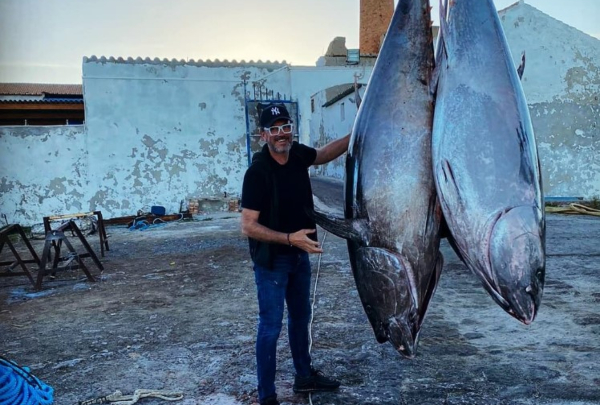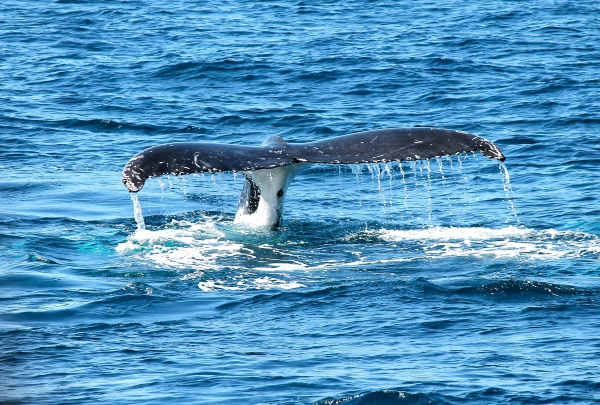Interview
Luigi Pomata, the red tuna chef

This Sardinian chef is Italy's best representative of tuna cuisine, with which he pays tribute to his town, Carloforte, and its traditional "tonnara" technique used to fish the species, acknowledged as sustainable fishing.
“San Antoniu- Cu ne desbarasse u camin e cu n'asciste in te nostre operasuin.
San Giorgiu- Cu ne libere dai pesci cattii.
San Gaitan- Cu ne mande da Pruvvidensa.
San Pe'- Cu ne mande na bugna pesca”
(San Antonio, who clears the way for us and assists us in our operations.
San Jorge, who delivers us from bad fish.
San Gaetano, who sends us Providence.
San Pedro, who sends us good fish).
This prayer in Tabarchino (a dialect of Ligurian origin) was and still is used to issue the order by the tonnara rais for the start of the matanzza in Carloforte, the last active instance of the practice in the Mediterranean, which has been in place since 1654. A life-or-death fight which turns the sea red, a genuine collective ritual by Sardinian fishermen, whose activities Luigi Pomata has watched since he was a child. This has inevitably left its mark on the gastronomic destiny of this chef born in Sardinia, in the town of Carloforte, known as "the red tuna chef" in Italy.
“Our tradition has always been linked to the fishing of red tuna which come to the Mediterranean every year for the breeding season. Life on our island is still marked by all the activities making ready for the fishing season. Tuna has been the only source of survival for my town for many years, and I've learned to love it, work with it and appreciate it, and publicise it to an ever-growing audience, and explain that our ancient selection-fishing is the only method which really protects it". Pomata is tireless in the stand he makes for tonnara, a fishing technique which was the most popular back in the day, and which has now almost been reduced to a secular tradition, but still maintains its virtues because, despite its bloodiness, it is the least harmful to the species thanks to the selection it makes of the fish. “It is the most sustainable method because it catches tuna weighing 35 kg or more, and only for a month and a half each year", says the tuna chef.
Tonnara fishing is based on a set of nets lowered into the sea around the beginning of March, where they remain until June. The setup is divided into rows of chambers, connected by gates, which are also formed by sections of nets. The tuna take the same route year after year, and end up in the chambers. When the "rais" (the man in charge of tuna fishing) decides the time is right, he issues the necessary instructions for the tuna to be conveyed to the death chamber, where they are trapped.
Additionally, not only is this a good method in terms of preservation of the species, but from the gastronomic perspective Carloforte tuna is also highly prized for its quality. “It's the best tuna in the world because it's caught in the first "almadraba" technique encountered by the tuna when they enter the Straits of Gibraltar, and so it is rich in Omega3, it is fatty and very tasty", explains Luigi Pomata, and adds that "when the tuna reach the coasts of our island, their stomachs are empty because this is a tuna 'running' towards the mating zones. The absence of food removes the sharp flavours of the fish it usually feeds on from its pure flesh.
Cooking the island
The flesh of the Carloforte tuna, which leading Japanese sushi artists fight over, the tuna Luigi Pomata still showcases on the island it comes from. Pomata offers up his own tribute to red tuna in the kitchen of the homonymous restaurant in Cagliari, with fare based on local produce, albeit with a creative vision.
“My cuisine loves the ingredients and interferes with them as little as possible, in a bid to get the very best out of each aroma and flavour, in search of a perfect equilibrium, but I also like to get out there and find original combinations fusing the quality of our cookery with products from all over the world", says Pomata when asked to define his cuisine. Something he has also applied at all times to his beloved Carloforte tuna, which he has worked on with techniques and combinations that are uncommon in Italy, like when he opened the first sushi bar.
The Sardinian's culinary fare, of course, cannot be understood without the sea - "I come from the little island of San Pietro, which is on another island, Sardinia, on a peninsula, Italy. Wherever I look I always see the sea”-; but he also takes dry land into consideration. “Sardinia is an island with a huge culinary heritage, both in terms of food from the sea, and products from the land. The mild temperature all year round makes it possible to grow vegetables from all parts of the world, where they find the perfect climate", explains Luigi, and he does not omit to mention that his grandfather was a farmer, and there was always a plantation at home. “Knowing about the ingredients we work with is the best way to be a good chef, and having the chance of direct contact with the countryside is a great privilege", says Pomata, who is now the third generation of the family working in catering, since his farmer grandfather decided to follow the path of sown produce from the field to the kitchen by opening a small restaurant in Carloforte.
Luigi Pomata's links to his island come as no surprise. They say that islanders are special, somehow linked in a different way to a territory isolated by the sea. But, just as islanders in general have similar personality traits, does their cuisine have them too? “In my experience", says the Italian, "the cooking styles on islands are all similar, the difficulties involved in communication with the mainland which led to the formation of their culinary background has made them very creative and special, and the lack of resources hones ingenuity, even among chefs", Luigi laughs. An idea on which he will certainly be able to elaborate when he arrives in Tenerife in July for the fifth Meeting of the Seas congress.
















